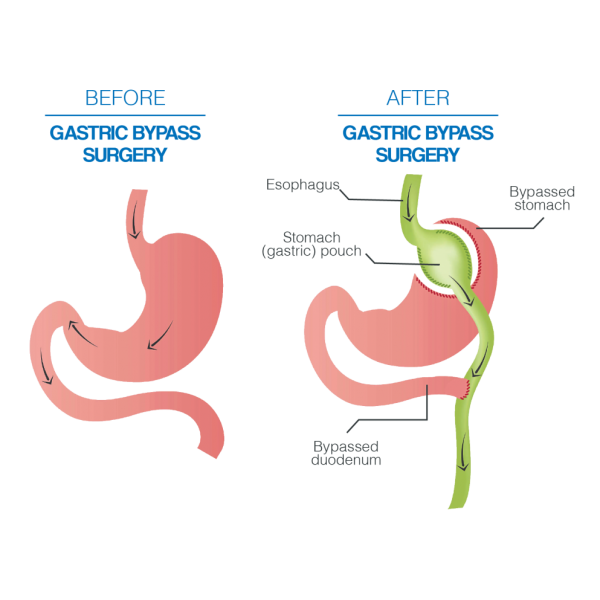Several different types of weight loss surgery are available in the present era. Usually, all these surgeries are done under general anesthesia (patient falls asleep) by using keyhole surgery (laparoscopic surgery). But these surgeries work in a slightly different way. During laparoscopic surgery, the surgeon makes small cuts in the tummy to insert a flexible viewing device to view inside while performing the surgery.
Main types of weight loss surgery involve:
- Gastric band
- Gastric Bypass surgery
- Sleeve gastrectomy
- Intra-gastric balloon
- Biliopancreatic diversion
- Primary obesity surgery endoluminal
Most effective weight loss surgery
Gastric bypass surgery is the most effective weight loss surgery. In gastric bypass surgery, a small pouch is created at the stomach top with the help of surgical staples. The pouch is then connected to the small intestine, hence bypassing the stomach. So, the capacity of the stomach decreases, and less food is enough to make you feel full. Less desire to eat and feeling of fullness will make you absorb fewer calories from the food being eaten.

Indications
There are some indications for weight loss surgery, including gastric bypass surgery.
- If the body mass index (BMI) is 40 or more. (extremely obese people)
- If BMI is in the range 35 to 39.9 (obesity), and it is causing various weight-related health issues, particularly severe sleep apnea, type 2 diabetes, or high blood pressure (hypertension).
- If your BMI is in the range of 30 to 34, but your excess weight is leading to various health issues.
In general, all patients with such high values of BMI are not entitled to weight loss surgery. Gastric bypass surgery is not safe for everyone. So, proper consultation with a medical specialist and surgeon, and certain medical guidelines can give you a proper suggestion for gastric bypass surgery, whether it is safe or not. Proper screening is done before suggesting gastric bypass surgery.
Advantages of gastric bypass surgery
If you’re tired of following diet plans and heavy exercise habits, still weight is not improving significantly, then gastric bypass surgery is done. Gastric bypass surgery is very useful for significant weight loss.
- It helps to lose excess weight, hence reducing the risk of developing potentially life-threatening weight-related health issues such as gastro esophageal reflux disease, heart disease, high blood pressure, high cholesterol, obstructive sleep apnea, Type 2 diabetes mellitus, stroke, cancer, and infertility.
- Weight loss is more significant and quick after gastric bypass surgery.
- This type of weight loss surgery has long-lasting results. Studies revealed that most of the patients can maintain more than 50 percent excess weight loss after 20 years of surgery.
Complications
Complications can occur in gastric bypass surgery both per-operative and postoperative. The complicated health risks can be short-term as well as long-term. Risks associated with gastric bypass surgery are much similar to other major abdominal surgery. These are
- Excessive bleeding
- Infection
- Adverse reactions to anesthesia
- Blood clots
- Lung or breathing problems
- Leaks in your gastrointestinal system
Longer-term risks and complications of gastric bypass can include:
- Bowel obstruction
- Dumping syndrome, causing diarrhea, nausea, or vomiting
- Gallstones
- Hernias
- Low blood sugar (hypoglycemia)
- Malnutrition
- Stomach perforation
- Ulcers
- Vomiting
Complications of gastric bypass can generally be cured easily, while some can be fatal if these are not attended to properly. Complications of gastric bypass surgery are much higher than any other weight loss surgery. Aspirin and other NSAIDS are strictly prohibited from patients after gastric bypass surgery. Patients are advised to take vitamins for life after surgery because decreased absorption of nutrients can lead to long-term mineral and vitamin deficiencies.
Conclusion:
Gastric bypass surgery is an effective method of excess weight loss. Certain criteria have been designed and proper medical and surgical consultation is required before gastric bypass surgery. Various complications are associated, but early detection and prompt treatment have proved to be effective.
Leave a Reply